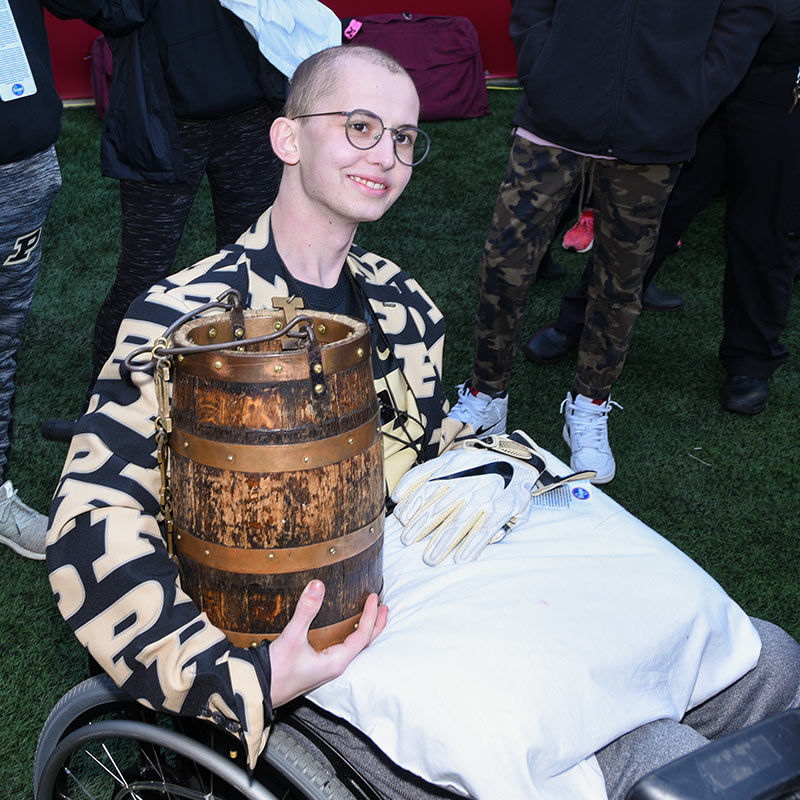I first heard of Tyler Trent-and his battle with cancer-during the October 20th Ohio State vs. Purdue football game. I remember when ABC interviewed Tyler during the game and he predicted a Purdue victory. Perhaps it was Boilermaker inspiration or sloppy play by the Buckeyes, but Purdue dominated the game 49-20. Though I’m a Buckeye fan, I was happy for Purdue that night.
Tyler, a 20-year-old student at Purdue University, suffered from osteosarcoma (bone cancer). He was battling this cancer for the third time in the last four years before passing away on New Year’s Day.
I personally cannot claim that I understand how difficult it is to suffer from cancer, either personally or with a close loved one. I can’t imagine what it would be like to divert my attention from college classes and future plans, to ongoing treatments with the uncertainty of even having a future (on earth, that is). But Tyler Trent’s perspective on life came from his identity as a follower of Jesus, not from his illness. His battle encourages me to focus on Jesus as he did.
1. Tyler’s strength came from his relationship with Jesus.
Mark Vroegop, Tyler’s pastor and family friend, wrote articles for The Indianapolis Star and Desiring God testifying that Tyler had a close relationship with Jesus. “I’ve seen, firsthand, Tyler’s steadfast faith in Jesus,” Vroegop wrote. In a January 8 article for the Indy Star, Vroegop wrote that Tyler developed a strong attitude toward his illness because, “Tyler loved Jesus. That’s it.”
It was a close relationship with Jesus that gave Tyler the perspective that though cancer was a painful setback, it wouldn’t destroy him. When he heard the news that cancer had returned to him, he leaned on 1 Thessalonians 5:16-18: “Rejoice always, pray continually, give thanks in all circumstances; for this is God’s will for you in Christ Jesus” (New International Version).
“Tyler modeled how to suffer as a follower of Jesus, and when ESPN told his story, he used his fame as a megaphone for winsome, Christ-centered perseverance. I was honored to be his pastor,“ said Vroegop.
2. Tyler believed that his greatest need was not to be healthy physically, but spiritually.
Vroegop wrote to the Indy Star that Tyler’s hope was not in physical healing, though every medical option was pursued. “Tyler knew that his greatest need was to be right with God.” His strong faith in Jesus before his cancer propelled him to focus on knowing God more deeply, instead of only focusing on getting well. Personally, I find it easier to focus on the circumstance itself and ask God “why?” But maybe God wants to do something in our lives through the circumstance that refines our faith and our character, making us more like Himself.
Tyler’s example encourages me to live rightly with God even before tragedy strikes.
3. Tyler’s cancer made his faith in Christ stronger, not weaker.
Since Tyler’s positive outlook came from a deeply rooted faith in Christ, he believed that God had a purpose for his life. Rather than viewing cancer as a threat, he chose to endure it by keeping his focus on Jesus.
A friend of mine once said that instead of focusing on a painful situation and becoming bitter, we should focus on God who is in control of the situation — trusting Him to shape us through the experience, growing closer to Him in the process.
When God allows us to go through trials, we don’t know the backstory. But He does (Job 1). And God uses those trials to refine us like gold (1 Peter 1:6-7).
4. Tyler modeled that the most important thing in life is having a relationship with Jesus.
Life on earth is short. Physical bodies, while some last longer than others, do not last forever. For Tyler, surviving cancer would have been a wonderful miracle. But his relationship with Jesus was what was most important to him — whether or not God healed him. Tyler was known for quoting his grandfather, saying, “If I live, I win. If I die, I win.”
For him, that meant not viewing death as the end. That’s what I find most difficult, yet amazing. To survive would mean to be a living miracle. But to die would mean meeting his Savior. For Tyler, it was a win-win situation.
I’ve attended several funerals of people who died later in life and were celebrated for the legacies they left behind. I hope to be one of them someday. Tyler was only 20, and I feel sad that he couldn’t live longer. But he touched a lot of lives and left a huge legacy, while making it clear that He served the God who provides hope that is everlasting. That encourages me to pursue God more than I ever have before, making the most of the precious life God has given to me.
At the 2018 College Football Awards, an emotional Tyler said, “A year ago I prayed that I would have the chance to share my story, and now it’s coming true.”
It’s evident that God chose to use Tyler’s pain to bring glory to Himself, and Tyler is being rewarded right now in the presence of Jesus. Well done, Tyler. And thank you for the example you set.













